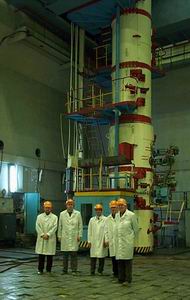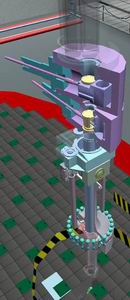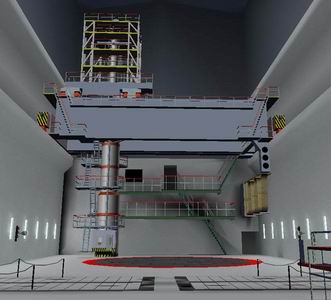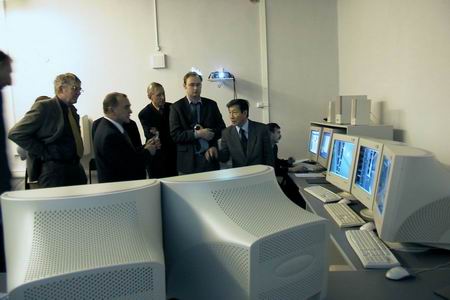

[ Site: Halden VR Centre ] [ Contents: About | Projects | Examples | HRP only | Careers ]

Halden, Norway, February 12, 2003 – Phase 2 of the simulator for training Russian specialists in refuelling at the Leningrad Nuclear Power Plant (LNPP) has been completed successfully. The VISIT department at IFE has worked on this project since 1999 together with LNPP and the Russian Research Institute "Kurchatov Institute" (RRC KI). The Norwegian Radiation Protection Agency (NRPA) has been the purchaser while IFE has provided the technical project management.
The main goal of the project has been to increase safety during refuelling by making it possible for operators of the refuelling machine to train on the most critical procedures. Refuelling takes place while the reactor is under full power and the annual number of refuelling sessions exceeds four hundred. Training with RMS-VR should help to minimise the risk for incidents.
RMS-VR is based on a mathematical simulator (MMSim) and a real-time 3D visualisation of the refuelling machine based on virtual reality technology (VR). MMSim simulates the mechanical functionality and the physical behaviour of the refuelling machine while the VR application (VRConsumer) visualises the mechanisms of the refuelling machine using 3D models. Furthermore a connection has been established between RMS-VR and the full-scope simulator (FSS) of reactor unit No. 3. This makes it possible to train on the cooperation between the operators of the refuelling machine and the reactor core.
Virtual reality enables trainees to use an interactive three-dimensional user-interface to further develop existing skills and to acquire new ones in a virtual environment. The processing power and 3D hardware rendering capabilities of current off-the-shelf personal computer hardware has made it possible to apply a number of techniques used in costly immersive simulators to low-cost desktop systems.
RRC KI has enhanced MMSim and established the FSS connection while IFE has developed the VRConsumer (the VR viewer) and inter-application communication system. The 3D models have been created mainly by LNPP after training by IFE. In addition LNPP has supported the project by providing technical data about the refuelling machine and the instructors at LNPP have continuously evaluated RMS-VR.
The system runs on low-cost standard hardware and software purchased from a local Russian supplier. The systems comprises of ten networked computers and screens. Four computers are used for the 3D visualisation system, four for MMSim, one for the instructor station, while the remaining computer manages data distribution between MMSim and VRConsumer. The VRConsumer runs on Microsoft Windows and is based on Java 3D from Sun Microsystems, while the MMSim software runs on Linux. The equipment has been installed in a separate room next to the full-scope simulator at the Technical Training Centre.


The VR model of the refuelling machine
The site acceptance test (SAT) took place Wednesday 18th December 2002 and was witnessed by representatives from NRPA, LNPP, RRC KI, IFE and the Russian radiation protection authorities, GAN. In addition, Russian national television and the local press were present. A news report about RMS-VR with associated video (both in Russian) can be found on the Russian Federal News's website.
The parties will continue the cooperation in 2003-2004 with the purpose of extending RMS-VR for use into training for maintenance in areas with high radiation and other personnel risks. LNPP considers the quality of the maintenance to be an important safety factor. Therefore, the plant is interested in using the VR technology as a tool for practicing work tasks, thereby increasing the quality of work and the level of safety. A significant tasks in relation to this will be to the transfer of knowledge to the younger generation of workers, as the elder staff will begin to retire within a few years.
The project is expected to result in a toolkit for implementing VR-based training that comprises of a simulator and pre-authored structured lessons. The toolkit will be sufficiently advanced to be useful while remaining easy enough to use to be practical and effective for the trainees and instructors at LNPP. Using a specialised toolkit to build and modify the training system is expected to significantly minimise development and maintenance costs while also enabling the instructors to play a much more active role in the development process.

LNPP instructor demonstrating RMS-VR at the SAT
| Got a question about these web pages? Send e-mail to VR-INFO@hrp.no. ©1997-2003 Institute for Energy Technology |